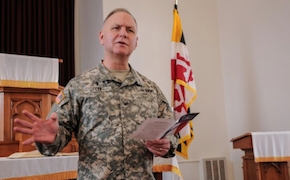The Institute for Religion, Politics, and Culture at Washington College will host a talk by the top chaplain in the Maryland National Guard, Col. William Sean Lee, on Thursday, May 1. Lee’s lecture, “Religious Liberty and the Military Chaplain: Current Challenges to Religious Liberty in the U.S. Armed Services,” will take place at 6:00 p.m. in Litrenta Lecture Hall, Toll Science Center.
Col. William Sean Lee is a senior officer in the Joint Forces Headquarters in Baltimore, as well as an ordained Baptist minister. He has studied theology and public affairs at premier institutions, including Harvard University, and regularly consults militaries around the world on best practices for ensuring the free exercise of religion for military personnel.
In 2005, Lee helped launch Partners in Care, an initiative of the Maryland National Guard Joint Force Headquarters Chaplain’s office. The program connects local faith communities with members of the Maryland National Guard to provide support and aid without religious obligation. Lee also co-authored Military Chaplains as Peace Builders: Embracing Indigenous Religions in Stability Operations (BiblioBazaar 2012), which advocates for the formal involvement of indigenous religious leaders in stability operations. He holds a Doctor of Ministry degree from Erskine Theological Seminary and is a graduate of the U.S. Army War College through the National Security Fellows Program at Harvard University’s John F. Kennedy School of Government.
The Institute for Religion, Politics and Culture is an academic program at Washington College that explores the contributions of religion to political and cultural life in the United States and around the world. The Institute sponsors visiting fellows, enriches the course offerings of the College, and conducts public events addressing the intersection of religion and political and cultural affairs.



Write a Letter to the Editor on this Article
We encourage readers to offer their point of view on this article by submitting the following form. Editing is sometimes necessary and is done at the discretion of the editorial staff.